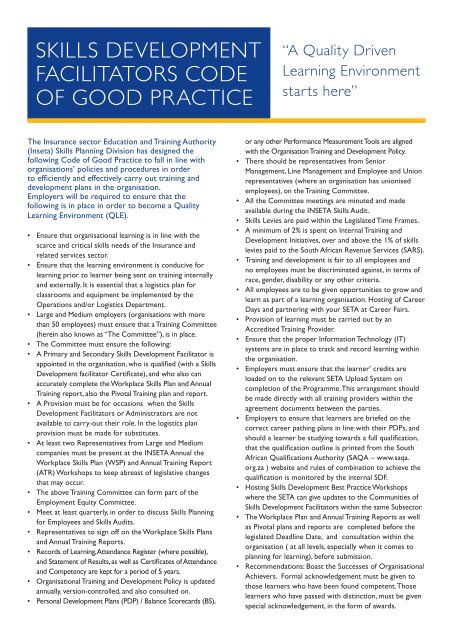4199 INSETA - Insider Newsletter Feb 2014 2
4199 INSETA - Insider Newsletter Feb 2014 2
4199 INSETA - Insider Newsletter Feb 2014 2
Create successful ePaper yourself
Turn your PDF publications into a flip-book with our unique Google optimized e-Paper software.
Skills Development<br />
Facilitators code<br />
of Good Practice<br />
“A Quality Driven<br />
Learning Environment<br />
starts here”<br />
The Insurance sector Education and Training Authority<br />
(Inseta) Skills Planning Division has designed the<br />
following Code of Good Practice to fall in line with<br />
organisations’ policies and procedures in order<br />
to efficiently and effectively carry out training and<br />
development plans in the organisation.<br />
Employers will be required to ensure that the<br />
following is in place in order to become a Quality<br />
Learning Environment (QLE).<br />
• Ensure that organisational learning is in line with the<br />
scarce and critical skills needs of the Insurance and<br />
related services sector.<br />
• Ensure that the learning environment is conducive for<br />
learning prior to learner being sent on training internally<br />
and externally. It is essential that a logistics plan for<br />
classrooms and equipment be implemented by the<br />
Operations and/or Logistics Department.<br />
• Large and Medium employers (organisations with more<br />
than 50 employees) must ensure that a Training Committee<br />
(herein also known as “The Committee”), is in place.<br />
• The Committee must ensure the following:<br />
• A Primary and Secondary Skills Development Facilitator is<br />
appointed in the organisation, who is qualified (with a Skills<br />
Development facilitator Certificate), and who also can<br />
accurately complete the Workplace Skills Plan and Annual<br />
Training report, also the Pivotal Training plan and report.<br />
• A Provision must be for occasions when the Skills<br />
Development Facilitators or Administrators are not<br />
available to carry-out their role. In the logistics plan<br />
provision must be made for substitutes.<br />
• At least two Representatives from Large and Medium<br />
companies must be present at the <strong>INSETA</strong> Annual the<br />
Workplace Skills Plan (WSP) and Annual Training Report<br />
(ATR) Workshops to keep abreast of legislative changes<br />
that may occur.<br />
• The above Training Committee can form part of the<br />
Employment Equity Committee.<br />
• Meet at least quarterly, in order to discuss Skills Planning<br />
for Employees and Skills Audits.<br />
• Representatives to sign off on the Workplace Skills Plans<br />
and Annual Training Reports.<br />
• Records of Learning, Attendance Register (where possible),<br />
and Statement of Results, as well as Certificates of Attendance<br />
and Competency are kept for a period of 5 years.<br />
• Organisational Training and Development Policy is updated<br />
annually, version-controlled, and also consulted on.<br />
• Personal Development Plans (PDP) / Balance Scorecards (BS),<br />
or any other Performance Measurement Tools are aligned<br />
with the Organisation Training and Development Policy.<br />
• There should be representatives from Senior<br />
Management, Line Management and Employee and Union<br />
representatives (where an organisation has unionised<br />
employees), on the Training Committee.<br />
• All the Committee meetings are minuted and made<br />
available during the <strong>INSETA</strong> Skills Audit.<br />
• Skills Levies are paid within the Legislated Time Frames.<br />
• A minimum of 2% is spent on Internal Training and<br />
Development Initiatives, over and above the 1% of skills<br />
levies paid to the South African Revenue Services (SARS).<br />
• Training and development is fair to all employees and<br />
no employees must be discriminated against, in terms of<br />
race, gender, disability or any other criteria.<br />
• All employees are to be given opportunities to grow and<br />
learn as part of a learning organisation. Hosting of Career<br />
Days and partnering with your SETA at Career Fairs.<br />
• Provision of learning must be carried out by an<br />
Accredited Training Provider.<br />
• Ensure that the proper Information Technology (IT)<br />
systems are in place to track and record learning within<br />
the organisation.<br />
• Employers must ensure that the learner’ credits are<br />
loaded on to the relevant SETA Upload System on<br />
completion of the Programme. This arrangement should<br />
be made directly with all training providers within the<br />
agreement documents between the parties.<br />
• Employers to ensure that learners are briefed on the<br />
correct career pathing plans in line with their PDPs, and<br />
should a learner be studying towards a full qualification,<br />
that the qualification outline is printed from the South<br />
African Qualifications Authority (SAQA – www.saqa.<br />
org.za ) website and rules of combination to achieve the<br />
qualification is monitored by the internal SDF.<br />
• Hosting Skills Development Best Practice Workshops<br />
where the SETA can give updates to the Communities of<br />
Skills Development Facilitators within the same Subsector.<br />
• The Workplace Plan and Annual Training Reports as well<br />
as Pivotal plans and reports are completed before the<br />
legislated Deadline Date, and consultation within the<br />
organisation ( at all levels, especially when it comes to<br />
planning for learning), before submission.<br />
• Recommendations: Boast the Successes of Organisational<br />
Achievers. Formal acknowledgement must be given to<br />
those learners who have been found competent. Those<br />
learners who have passed with distinction, must be given<br />
special acknowledgement, in the form of awards.


